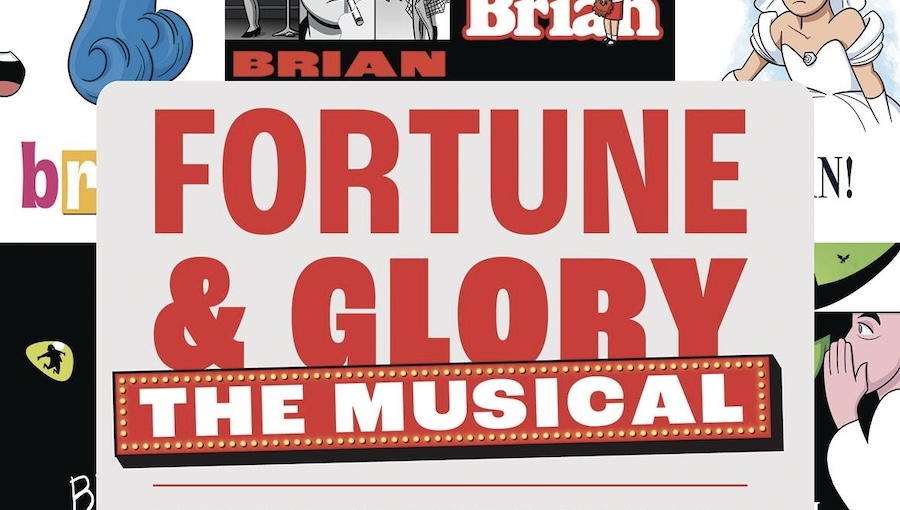In 1999 and 2000, acclaimed comic writer and artist Brian Michael Bendis published Fortune and Glory, a three-issue autobiographical story about his tantalizing, but ultimately ill-fated, flirtation with the Hollywood machine, as he attempted to get one of his indie comics turned into a film. The comic was then re-released 10 years later, colorized, with a few extras, then released again in 2023 which is when I first read it.
At the end, Bendis teases the possibility of a sequel, listing a few of the many adventures and misadventures he’s had in the years since that could provide fodder. Now, he finally has the sequel – Fortune and Glory: The Musical – about his experience working on a Broadway play. Will this endeavor be more successful than his previous one? Not likely, especially when you learn that the musical he’s working on is the infamous Spider-Man: Turn Off the Dark.
It’s told in the same style as the original comic, with Bendis as both main character and narrator, breaking the fourth wall to provide necessary context and backstory; however, if you’re unfamiliar with the life and career of Brian Michael Bendis, you’d almost think the two comics were about two completely different (though similar-looking) people.
In Fortune and Glory, Bendis is a struggling indie artist, creating gritty, noir, crime comics. He doesn’t have any connections, any clout. He doesn’t write superheroes, and he isn’t published by anybody you would have heard of.
In The Musical, he’s working for Marvel. He’s the creator of such characters as Jessica Jones, Miles Morales, and countless others that have become a major part of the cultural lexicon, and he holds a world record for writing Spider-Man. How did he get to this point from the humble beginnings we saw in the previous volume, flitting around the outer edges of comicdom and struggling to be taken seriously? Well, he’d be happy to tell you—eventually.
In truth, this isn’t really the story of how Brian Michael Bendis worked on the Spider-Man musical. It’s the story of how he became someone who would even be asked to work on the Spider-Man musical. And it’s not really a continuation of Fortune and Glory. It’s a completely different story with a bit of overlap.
In Fortune and Glory, Bendis spends a few pages talking about how he got into writing comics and some of the titles he’d written, before jumping into how the opportunity for a movie came about. In The Musical, he tells the story of how he got into comics in the first place: how a childhood spent reading X-Men and Fantastic Four made him fall in love with storytelling, how he worked for years to become an artist and struggled to find teachers who would take the comics medium seriously, and how he bought every comic and comic-related thing he could find or afford, in order to hone his craft and learn the secrets of how to break into this industry he idolized so much.
Most of the story is about Bendis’ life and career, interspersed with scenes of him preparing for and navigating meetings with the director of the Spider-Man musical, trying to separate the brilliant ideas from the insane ones. It’s a fun story, an interesting glimpse into the evolution of Bendis’ career, and a fascinating insider’s perspective on the comics industry. The only issue is, it can be pretty disjointed.
The story is told almost entirely in flashbacks—which then become flash forwards, which can in turn become flashbacks to somewhere else entirely. He’ll stop the narrative and go off on a tangent in order to make a point about what’s going on—only to tell a story that doesn’t seem to have anything to do with what’s going on. Bendis freely admits this in the comic, commenting several times on how off-track the story is getting, or saying things like, “What does this have to do with anything? I’m getting to it, I promise!”
In the end, I can’t fault him too much. This is basically the way I tell stories, too. And while at times the narrative can get bogged down with tangents, in the end, it’s a good story and worth reading. If you’re a fan of the first Fortune and Glory, of the business and craft of comics, or of Brian Michael Bendis’ work in general, you’ll definitely want to check out Fortune and Glory: The Musical.
Creative Team: Brian Michael Bendis (script), Bill Walko (art), Wes Dzioba (colors), Joshua Reed (letters)
Publisher: Dark Horse Comics
Click here to purchase.

